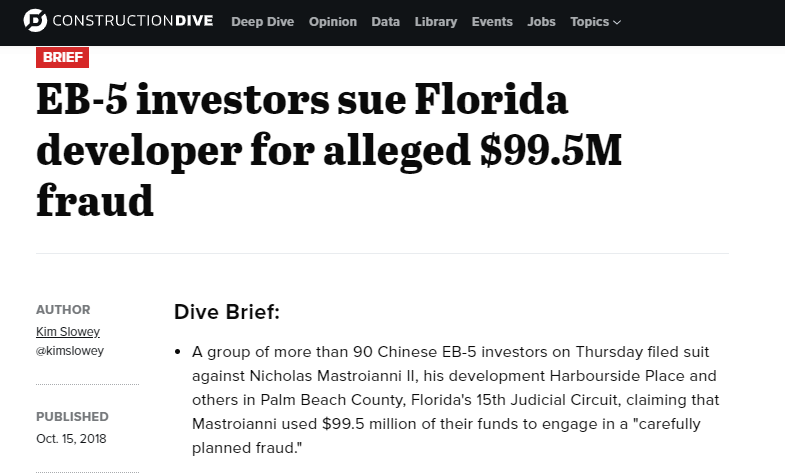EB-5 investors sue Florida developer for alleged $99.5M fraud
Dive Brief:
- A group of more than 90 Chinese EB-5 investors on Thursday filed suit against Nicholas Mastroianni II, his development Harbourside Place and others in Palm Beach County, Florida's 15th Judicial Circuit, claiming that Mastroianni used $99.5 million of their funds to engage in a "carefully planned fraud."
- The investors allege that their investment was supposed to go toward securing a first-priority, secured construction loan for the Harbourside Place mixed-use project in Jupiter, Florida. Instead, they claim, Mastroianni — through a collection of shell companies that owned and controlled every aspect of the project, from the EB-5 regional center to Harbourside itself — obtained various lines of credit and senior loans outside the scope of the offering documents for the project. The investors allege that he intentionally defaulted on the loans, and without proper notice, converted the EB-5 investment from debt to unsecured, nonvoting equity. They allege that Mastroianni intentionally misled them so that they would be "wiped out" and lose their position in the project.
- The plaintiffs are asking for the court to appoint a receiver or corporate monitor that will oversee the financial dealings and management of the project and a jury trial. The plaintiffs' attorney Jeffrey Schneider of Levine Kellogg Lehman Schneider + Grossman LLP in Miami told Construction Dive that the next steps are up to Mastroianni. He can move to dismiss, answer the complaint or try to settle, Schneider said.
-
Dive Insight:
Mastroianni, in his capacity as head of the U.S. Immigration Fund, reportedly has had business dealings around potential EB-5 investments with President Donald Trump's son-in-law's family business, the Kushner Cos., as well as with former Trump lawyer Michael Cohen.
EB-5 investors donate between $500,000 and $1 million per qualified project in exchange for expedited processing of their green card applications, although these deals don't guarantee they will be awarded a visa. Developers make presentations to investors in order to spur investment, with the offering documents and sales pitches developers provide conforming to U.S. Securities and Exchange Commission guidelines.
If the allegations against Mastroianni prove true, he wouldn’t be the first developer to play fast and loose with the EB-5 program rules as established by the U.S. Citizenship and Immigration Services (USCIS).
Ariel Quiros, the former owner of the Jay Peak Resort in Jay, Vermont, recently settled with state and federal agencies regarding claims he misused EB-5 investor funds for a series of expansions at the resort. He also supposedly gave immigration attorneys $25,000 kickbacks for each foreign investor they brought into the project. The state-run Vermont EB-5 Regional Center, which was supposed to watch over EB-5 projects, was closed by the USCIS.
Litigation Cases
- Chinese Investors - limited partners of Harbourside Funding, LP, vs U.S. Immigration Fund, LLC & Florida Regional Center & Nicholas Mastroianni II
- Chinese investors vs U.S. Immigration Fund - NY & Nicholas Mastroianni III
States
- Florida
Securities Disclaimer
This website is for informational purposes only and does not constitute an offer or solicitation to sell shares or securities. Any such offer or solicitation will be made only by means of an investment's confidential Offering Memorandum and in accordance with the terms of all applicable securities and other laws. This website does not constitute or form part of, and should not be construed as, any offer for sale or subscription of, or any invitation to offer to buy or subscribe for, any securities, nor should it or any part of it form the basis of, or be relied on in any connection with, any contract or commitment whatsoever. EB5Projects.com LLC and its affiliates expressly disclaim any and all responsibility for any direct or consequential loss or damage of any kind whatsoever arising directly or indirectly from: (i) reliance on any information contained in the website, (ii) any error, omission or inaccuracy in any such information or (iii) any action resulting therefrom.




